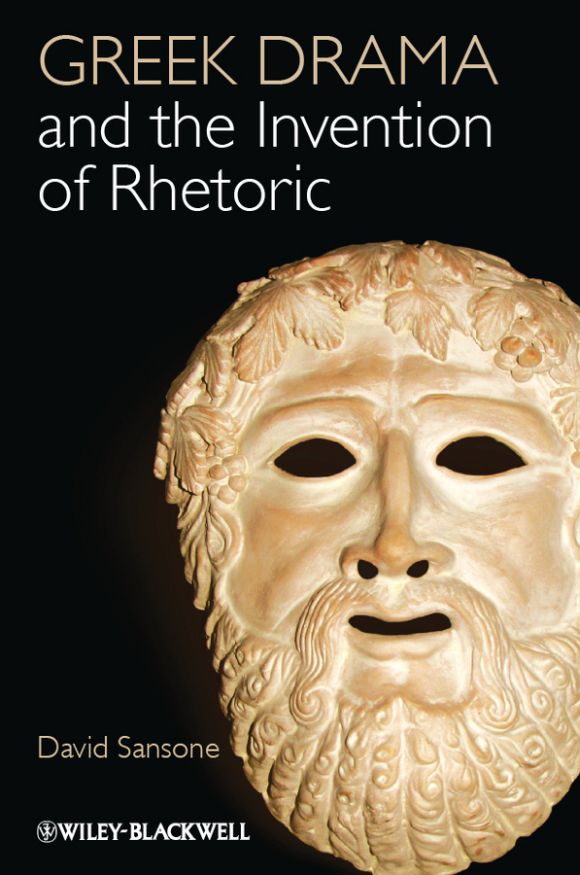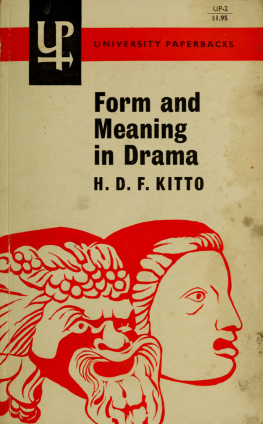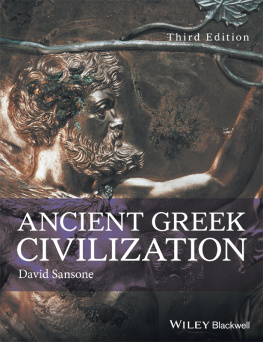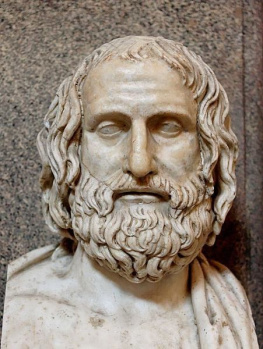Sansone - Greek Drama and the Invention of Rhetoric
Here you can read online Sansone - Greek Drama and the Invention of Rhetoric full text of the book (entire story) in english for free. Download pdf and epub, get meaning, cover and reviews about this ebook. City: Malden;Oxford, year: 2012, publisher: Wiley-Blackwell, genre: Detective and thriller. Description of the work, (preface) as well as reviews are available. Best literature library LitArk.com created for fans of good reading and offers a wide selection of genres:
Romance novel
Science fiction
Adventure
Detective
Science
History
Home and family
Prose
Art
Politics
Computer
Non-fiction
Religion
Business
Children
Humor
Choose a favorite category and find really read worthwhile books. Enjoy immersion in the world of imagination, feel the emotions of the characters or learn something new for yourself, make an fascinating discovery.

- Book:Greek Drama and the Invention of Rhetoric
- Author:
- Publisher:Wiley-Blackwell
- Genre:
- Year:2012
- City:Malden;Oxford
- Rating:4 / 5
- Favourites:Add to favourites
- Your mark:
- 80
- 1
- 2
- 3
- 4
- 5
Greek Drama and the Invention of Rhetoric: summary, description and annotation
We offer to read an annotation, description, summary or preface (depends on what the author of the book "Greek Drama and the Invention of Rhetoric" wrote himself). If you haven't found the necessary information about the book — write in the comments, we will try to find it.
Sansone: author's other books
Who wrote Greek Drama and the Invention of Rhetoric? Find out the surname, the name of the author of the book and a list of all author's works by series.
Greek Drama and the Invention of Rhetoric — read online for free the complete book (whole text) full work
Below is the text of the book, divided by pages. System saving the place of the last page read, allows you to conveniently read the book "Greek Drama and the Invention of Rhetoric" online for free, without having to search again every time where you left off. Put a bookmark, and you can go to the page where you finished reading at any time.
Font size:
Interval:
Bookmark:


This edition first published 2012
2012 John Wiley & Sons, Inc.
Wiley-Blackwell is an imprint of John Wiley & Sons, formed by the merger of Wileys global Scientific, Technical and Medical business with Blackwell Publishing.
Registered Office
John Wiley & Sons, Ltd, The Atrium, Southern Gate, Chichester, West Sussex, PO19 8SQ, UK
Editorial Offices
350 Main Street, Malden, MA 02148-5020, USA
9600 Garsington Road, Oxford, OX4 2DQ, UK
The Atrium, Southern Gate, Chichester, West Sussex, PO19 8SQ, UK
For details of our global editorial offices, for customer services, and for information about how to apply for permission to reuse the copyright material in this book please see our website at www.wiley.com/wiley-blackwell .
The right of David Sansone to be identified as the author of this work has been asserted in accordance with the UK Copyright, Designs and Patents Act 1988.
All rights reserved. No part of this publication may be reproduced, stored in a retrieval system, or transmitted, in any form or by any means, electronic, mechanical, photocopying, recording or otherwise, except as permitted by the UK Copyright, Designs and Patents Act 1988, without the prior permission of the publisher.
Wiley also publishes its books in a variety of electronic formats. Some content that appears in print may not be available in electronic books.
Designations used by companies to distinguish their products are often claimed as trademarks. All brand names and product names used in this book are trade names, service marks, trademarks or registered trademarks of their respective owners. The publisher is not associated with any product or vendor mentioned in this book. This publication is designed to provide accurate and authoritative information in regard to the subject matter covered. It is sold on the understanding that the publisher is not engaged in rendering professional services. If professional advice or other expert assistance is required, the services of a competent professional should be sought.
Library of Congress Cataloging-in-Publication Data
Sansone, David.
Greek drama and the invention of rhetoric/David Sansone.
p. cm.
Includes bibliographical references and index.
ISBN 978-1-118-35708-8 (hardcover : alk. paper)
1. RhetoricHistory. 2. Greek dramaHistory and criticism. I. Title.
PN183.S26 2012
808.009dc23
2012011202
A catalogue record for this book is available from the British Library.
Jacket image: Greek theatre mask Repina Valeriya / Shutterstock
Jacket design by Nicki Averill
For Alexander and Nicolas
,
.
la philologie mne au crime
Eugne Ionesco
In his review of Lorna Hutsons The Invention of Suspicion, a book concerned with the transformative influence of legal terminology and rhetoric on Renaissance drama, Peter Holbrook writes that the move from a primarily symbolic or gestural drama to the more realistic theater of Shakespeare and his contemporaries is dazzling, an innovation as momentous as when silent movies gave way to the talkies, or Hollywood adopted Technicolor; at the time, people must have felt a new world had been discovered. Oddly missing from Holbrooks comparanda is the momentous creation of the cinema itself, or the invention of drama. The thesis of the book that you hold in your hands or that momentarily occupies your digital display is that, first, the invention of the drama in Athens around 500 BC was at least as dazzling and momentous an innovation as the introduction of Technicolor; and, second, that this revolutionary innovation inspired the formal study of rhetoric. The first part of this thesis is uncontroversial, perhaps even self-evident; the second part is heretical.
Ever since the time of Aristotle, it has been an article of faith that the drama became more rhetorically sophisticated in the fifth century BC as a result of its exposure to the influence of rhetorical theorists and teachers. But the origins of rhetoric are so uncertain, and the accounts of those origins so confused and unsatisfactory, that we ought not to rely on faith when, it is proposed, a more reasonable explanation of the relationship between rhetoric and the invention of the drama is available. Specifically, I will argue that the essential feature of the drama that the playwright is required to compose speeches for characters, who are often in a state of conflict, to use in interaction with one another before an audience in the theater is sufficient to account for the self-conscious theorizing about forms of argumentation that is the essential feature of formal rhetoric. And, since the development of formal rhetoric is acknowledged, even by those who adhere to the traditional account, to be later than the invention of the drama, it would seem appropriate to entertain the possibility that rhetoric owes more to the drama than vice versa. Still, the authority of Aristotle and the seductive force of longstanding tradition are formidable obstacles to overcome, especially given the nature of the available evidence. And so it will be necessary to argue in support of this thesis at some length. It is hoped that even those readers who are not, in the end, convinced by the arguments presented here will at least find that it has been invigorating to have their faith tested.
Polite audiences in Chicago, New Haven, and Urbana have been subjected to having their faith, and perhaps their patience, tested by oral presentations of some of the arguments advanced in this book. I am grateful for their indulgence and their valuable comments. I am also grateful for the financial support of the Loeb Classical Library Foundation, which made possible a sabbatical leave that was devoted to work on the early stages of this project. Jonathon Auxier, Victor Bers, Tom Conley, Scott Garner, John Gibert, Donald Mastronarde, and Doug Olson have all contributed in various ways; I thank them for their assistance and their personal support, which, I hasten to add, does not necessarily extend to their support of the thesis argued here. Finally, I wish to express my thanks to my editor at Wiley-Blackwell, Haze Humbert, and to the reader for the press, whose healthy skepticism has caused me to reformulate a number of my more confident statements.
Two of Aristophanes earliest plays involve a comic hero who finds himself in serious trouble and needing the help of an expert in order to save himself from disaster. In Acharnians, produced at the Lenaea in 425 BC, Dicaeopolis is pursued by a chorus of irate fellow demesmen intent upon stoning him to death for having ratified a private peace treaty with the Lacedaemonians, the benefits of which only he and his family can enjoy. In Clouds, written for performance at the Dionysia two years later, Strepsiades faces imminent financial ruin, since his creditors are about to demand prompt repayment of his massive debts and are sure to take him to court when he defaults on his loans. Both characters urgently require the services of what we would today call a lawyer, a trained professional who knows how to argue persuasively and, if necessary, deviously. It may come as a surprise, then, to modern audiences of these comedies that neither Strepsiades nor Dicaeopolis resorts to the ancient equivalent of a lawyer. The reason for this is that, in ancient Athens, there was nothing corresponding to the modern attorney at law. While litigants might have someone else prepare a speech for them to deliver, or could enlist supporters to deliver additional speeches on their behalf in court (Rubinstein 2000), citizens were expected to represent themselves either in a court of law or when speaking to a proposal in the Assembly. It is usually assumed, however, that there existed at this time professionals who claimed to be able to teach citizens how to speak effectively and persuasively in public, and one might expect either or both of Aristophanes heroes to seek out one of these supposed experts in order to extricate himself from his pressing difficulties by learning the art of public speaking.
Next pageFont size:
Interval:
Bookmark:
Similar books «Greek Drama and the Invention of Rhetoric»
Look at similar books to Greek Drama and the Invention of Rhetoric. We have selected literature similar in name and meaning in the hope of providing readers with more options to find new, interesting, not yet read works.
Discussion, reviews of the book Greek Drama and the Invention of Rhetoric and just readers' own opinions. Leave your comments, write what you think about the work, its meaning or the main characters. Specify what exactly you liked and what you didn't like, and why you think so.










![Euripides - Classic Greek Drama: 10 Plays by Euripides in a Single File [NOOK Book]](/uploads/posts/book/43473/thumbs/euripides-classic-greek-drama-10-plays-by.jpg)